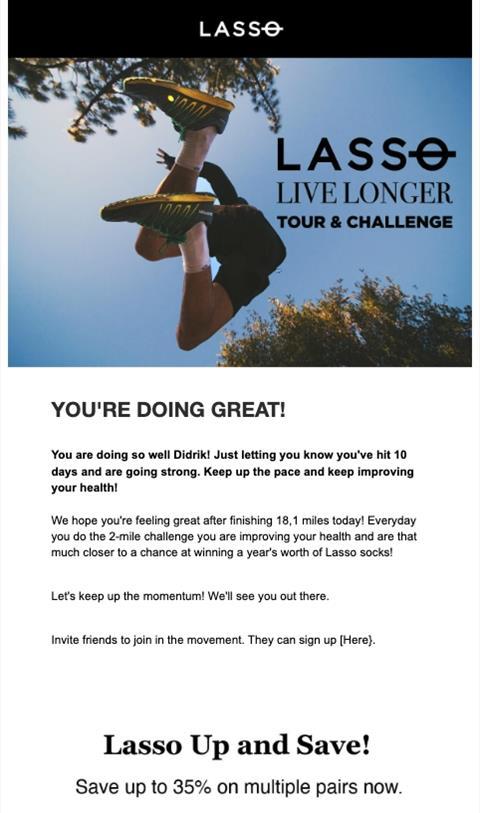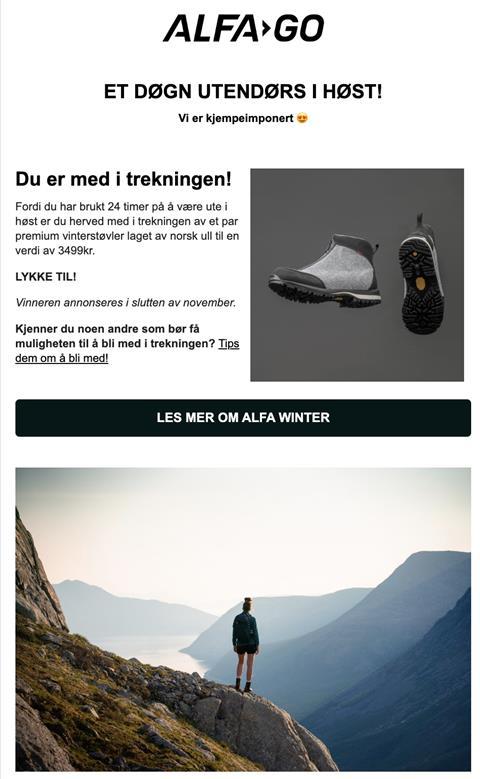Loyalty clubs are an essential element of running any sports retail or service-based business – just ask Nike, which has revealed that its 140 million-plus Nike App members spend about three times more than the average website guest customers. The good news is: You don’t have to be a giant like Nike to strengthen your bond with your customer. We show you how.

All the big players have developed programs that target exclusivity, community, personalization and an omnichannel experience, identifying early that consumers desire something way beyond transactional loyalty and instead sought out engagement with customers. That kind of customer/retailer bond requires a proposition that goes the extra mile.
The data value of experiential marketing (such as coaching sessions, motivational challenges and virtual exercise classes) that the likes of Nike and Adidas offer through their loyalty strategies means they can add leveraging customer behavior insights into their skill sets to outperform rivals. But for smaller enterprises, there is a major hurdle to offering this kind of program; the costs and time involved in developing or acquiring and maintaining the necessary infrastructure.
That was until Stready entered the arena this time last year with its white-label solution to level the playing field. “Stready enables organizations to incentivize physical activity as part of their marketing activities,” says sports tech entrepreneur Lars Andreassen, CEO and co-founder of Stready. “It’s something all the big brands already do through their apps, but that kind of functionality hasn’t been available to the mid-sized market…until now.”
Stready offers a simple solution
Stready set out to solve the issue of how to connect businesses with people, gaining access to the valuable data needed to create engaging customer experiences.
Once signed up to Stready, businesses can either pick a challenge from one of Stready’s pre-made templates or choose a custom-designed event aligned with their brand identity. This automatically generates pre-made flows within their CRM. It enables content to be written and live online quickly. People simply sign up through the business’s web page, like any other mailing list or membership club, and then are prompted to connect their wearable device.

The success of the system is its simplicity – once a workout, run or activity has been logged, an email or SMS can be triggered automatically and sent from the business’s own systems (Mailchimp, Klaviyo or Voyado) to the member, congratulating them on their achievement and offering a personalized reward, such as exclusive content, raffle prizes, access to events, charity donations or discounts.
Want to know more? Visit www.stready.com
Research from CRM platform Hubspot identifies tech-led experiential marketing and virtual events as remaining strong trends within online marketing in 2022 and beyond, particularly with the explosion of the metaverse in retailing journeys. Stready gives businesses impressive marketing muscles without the need to put in intensive workouts.
“We keep it simple, affordable and easy to implement,” says Lars. “They don’t need any developers; it’s something that the marketing department can do. We charge when we deliver value, not because we are setting you up, so it helps get businesses set up quickly and see if it’s right for them.”
In the fitness industry, the agile use of insights from this kind of campaign can help brands with the creation of a culture and a lifestyle around their customers’ interests. For clubs and venues, they can position themselves not just as a place for exercise but more as an experience, combining entertainment and experience with networking and well-being. For brands, it’s about offering a retail experience that is personal and makes customers feel like they are part of something that goes beyond a transactional relationship.

The value and ethics of data
More than 57% of consumers are willing to share personal information in exchange for personalized discounts and offers, according to a Salesforce survey of 7,000 people.
Stready’s model is based around incentivizing workouts in a trustworthy, positive way – data swapped for a perk from a brand the customer has authorized. For the brand, the data is up to date, clean and relevant; they are not swamped with information that requires extra resources to sift through.
“People expect personal experiences,” says Andreassen, “but they are not willing to share data at all costs, you have to give something back to get access to that data. So rewarding them for staying active becomes the concept that enables the transaction of data. It’s an ethical approach. We’re only using specific data, we’re not selling it to third parties, we are just enabling brands to personalize product offerings based on what types of workouts their customers are currently into.”
“The data our customers get is very valuable. We know specifically for how long and how often users workout, and what they do – ski, run, climb – so that means you can tailor content to specific users based on what you know they do and like.”
For further information and to book a product demo, visit www.stready.com
Andreassen adds that a climate of tougher privacy regulations and higher marketing costs makes it extremely relevant for brands to host their own loyalty concepts: “Increasing the lifetime value of customers is ever-more important. Through our concept, we see that we have a really low turn rate and that they put a lot of the money back into the product after they join.”
This is something Stready customer Alfa Footwear is happy to verify. Sales and marketing manager Hans Jørgen Kvåle says: “Initially, we planned to use the tool mainly to engage our existing audience, but we see that it has been truly effective in generating new leads as well.”
- Alfa launched its Stready-powered loyalty program Alfa Go in April.
- It currently has a CAC of $4 per cold signup.
- It has a revenue of $6 per user per month, breaking even on new signups in less than three months.
A truly engaging experience
Consistently delivering the right messaging at the right time is part of Stready’s success.
Andreassen says: “A lot of customers that sports brands already have actively track their workouts. Tapping into that to create better experiences, there’s something incredibly meaningful in helping you to decide to open and read their content.”
The average opening rate on emails powered by Stready is 75 percent, which is huge in comparison to e-commerce at 16 percent, health and fitness at 22 percent, retail at 18 percent and sports at 25 percent (Mailchimp, 2022).
“Our high opening rate shows people are really engaged,” says Lars. “And our click-through rate is five to 10 times higher than you would expect in standard email marketing.
“The email from us not only has personal content and rewards specifically based on your efforts, and not, as is usual with loyalty, based on a purchase but about something you care about. But that email also comes perfectly timed, one minute after you have tracked your workout when you’re happy and excited and have been thinking about the rewards you will receive for doing this workout – and that’s why almost everyone opens their emails.”
“Our first ever customer who is still with us after about a year, has never had a month with a lower opening rate of 75%.”

Sustainable growth through Stready
The health and fitness market in Europe – which managed to ride the storm of Covid and is emerging strongly for the way it flexed to new demands and because people are invested now more than ever in health – was worth an estimated $22.94bn in 2021, and while this is a significant drop from the market size of more than $30bn in 2019 (Statista) the global sportswear market is predicted to continue growing over the next few years reaching $455bn by 2024, up from an estimated $366bn in 2021.
Stready offers brands a new way to compete for market share, but social responsibility and sustainable growth are as much a part of the company ethos – both for Stready and its aspirations for its customers – as sales growth.
Number three in the United Nations’ sustainable development goal is to ensure healthy lives and promote well-being for all at all ages. Andreassen says: “Stready enables businesses to take meaningful action towards reaching this goal.”
It is one of the reasons Alfa Footwear is doubling down on Stready, launching a larger campaign encouraging people to go outside this autumn. “At Alfa, we care about enabling people to experience nature. For us, it was important not to be seen as competitive or merit-focused,” says Hans. “That is why simply rewarding people for spending time outside was a good fit for us.”
For Kvåle, the development of Stready has been part of his personal fitness journey. As someone who at one point in his life lacked the motivation to exercise, he was searching for a way to turn his own success story – of tracking and incentivizing activity to help him become healthy through running and paragliding (two activities he continues to enjoy) – into a sustainable business.
His fellow co-founders – who include Norwegian elite cross-country skier Didrik Tonseth – are equally passionate about the value of Stready’s data and motivation offer: Didrik knows just how important data is to success, citing training analysis as an important element of his journey to 4 x 10km relay Olympic gold medallist at PyeongChang 2018.
“We spent a lot of time together working on different concepts until we came up with something we believed in enough to really start scaling,” says Andreassen. “What we did was figure out what was the simplest thing we could do to deliver the value the customer needs – and that’s what we built.”
Stready is currently engaged in a seed funding round. Inquiries should be directed to lars@stready.com. For further information and to book a product demo, visit www.stready.com





